Harris' loss was etched long before her 100-day sprint
Way to Win post-election polling shows Democrats’ economic narrative was too broken to fix by the time Harris arrived
Introduction
Economic issues fueled by high inflation and a systemic affordability crisis dominated the political landscape on which Vice President Kamala Harris waged and ultimately lost an unlikely battle to win the White House in a roughly 100-day sprint to Election Day. That’s the picture that emerges from Way to Win’s post-election battleground state survey of 2,450 voters conducted by David Binder Research from Oct. 28 - Nov. 7—including oversamples of Black, Latino, and AAPI voters. And despite all the pundit speculation over "wokeness" and progressive "purity tests,” voters’ simmering discontent with their economic circumstance was likely baked into the electorate long before Harris secured the Democratic nomination.
The original sin of the cycle was the broader failure across the Democratic campaign and media ecosystems—starting in 2022—to tell a vivid, strong story about why things still felt so terrible even though the economy was improving, and to provide voters with a clear villain to hold accountable for their continuing pain: 50 years of largely unchecked GOP-driven predatory capitalism. In the absence of this clear narrative, voters were susceptible to the 2024 evolution of the Big Lie: that Democrats are focused on helping a rotating selection of “othered groups,” but not “you” (i.e. the average voter). In fact, Democrats under the Biden-Harris White House were wholly focused on policies to help make life better for Americans struggling economically. The groups who bore the brunt of Republican scapegoating this cycle were immigrants, trans people and anything “woke,” but this narrative can conveniently shift blame towards any group Republicans choose to vilify.
Trump outperformed Harris across groups on 2024’s top issue: Jobs and the economy
Our survey showed that among the issues battleground voters deemed most important, Harris voters were deeply motivated by democracy, freedom and rights, and fitness for office while Trump voters prioritized immigration and the border, jobs and the economy, and cost of living. Among persuadable voters in particular, Trump roundly outpaced Harris on economic and affordability issues.
Importantly, jobs and the economy proved to be the most motivating issue across race and education. The only voters who prioritized democracy over jobs and the economy were college-educated Black voters. Non-college Black voters along with college and non-college white, Latino, and AAPI voters all centered jobs and the economy as their top issue.
And while white Trump voters named immigration and the border as their top issue, Trump voters of color (Black, Latino, and AAPI) overwhelmingly prioritized jobs and the economy. Across race, Harris voters almost uniformly prioritized democracy, but she fell short on the economic battle, which is where the contest was won and lost.
Low enthusiasm and shifting vote choice hamstrung Harris
Harris’ loss was fueled in part by flagging motivation among her own voters along with some erosion among 2020 Biden voters who defected to Trump in 2024—it wasn’t one or the other, it was both.
Trump voters reported being more motivated by a 4-point margin, 92% - 88%, with motivation being higher among Trump-leaning groups such as white and Republican voters. White voters, for instance, were 8 points more motivated at 91% than Black and AAPI voters at 83% each. And among those who only vote in presidential cycles, Trump voters reported being more motivated to vote by a 14-point margin (89% - 75%); he also held a 6-point advantage in enthusiasm among new voters.
More Harris voters said they voted primarily to cast a ballot against Trump, while many Trump voters said they affirmatively voted for their candidate, with just 61% of Harris voters describing their choice as being “mostly for” the candidate versus 85% of Trump voters who said the same. A little over a third of Harris voters said they cast a ballot to prevent another candidate from winning—less than half as many Trump voters (14%) said the same.
Among voters who self-reported voting in both 2020 and 2024, 3% said they shifted their vote from Biden 2020 to Trump 2024, while only 1% said they defected from Trump 2020 to Harris 2024. Trump made small gains across nearly all groups while Harris either stagnated or lost votes. Harris’ erosion was particularly pronounced among voters of color.
Persuadable Voters broke for Trump
The survey found 22% of voters were “persuadable,” defined as voters who self-identified as one of three things: Not certain to vote, not certain how they would vote, or did not vote for either Harris or Trump. This cohort broke for Trump over Harris, 51% - 41%, and it was largely made up of groups that are typically critical parts of the Democratic coalition, including younger voters and voters of color.
Among the most persuadable voters were moderates (+16 points more likely to be persuadable than voters overall), Independents (+10), under 45 voters (+8), men (+6), and voters of color (Latino +3, Black +2, AAPI +1, and mixed race race +1).
Vote choice motivations: Harris voters uniquely focused on Trump while Trump voters varied
In open-ended responses in the survey, the main reason Harris persuadables voted for her was the same reason Harris voters chose her overall: Trump.
The main reason Trump persuadables voted for him was, similarly, Harris, but overall Trump’s voters said they were motivated by the economy and border security.
What’s notable about persuadable Trump voters is that many of them explained their vote by echoing right-wing talking points that permeated the conservative media ecosystem. In open-ended responses from discussion board participants, one older Black Democratic man in Wisconsin who chose Trump called Harris “an empty candidate” while another older Black Democratic man in Michigan cited a “lack of a plan for Harris.”
The Harris campaign devoted a lot of resources to introducing the vice president to voters and releasing detailed policy proposals, yet Trump persuadables seemed wholly unaware or maybe unswayed by that effort.
The Bigger Picture
Many of the survey’s conclusions track with those touched on by other polling outfits, including that economic issues and affordability emerge not only as voters’ top issue, but also as the issue on which Trump simultaneously won persuadable voters and ate into traditional Democratic base support. It’s a frame that suggests Trump’s gains among voters of color were part of a larger economic sweep of the electorate rather than novel inroads born of ideological realignment, and it relies on a familiar decades-old mantra that endures: It’s the economy, stupid. In short, values-based issues such as democracy and fitness for office took a backseat to voters’ exasperation with the punishing cost of living and persistent inflation that has overrun their lives throughout the pandemic recovery period, piled on top of 50 years of crippling income inequality.
Indeed, comparing Trump’s 2020 to 2024 vote share (using participants’ self-reporting), he increased support across a stunning array of groups, posting significant gains among Independents (+15), AAPI voters (+11), Millennials (+8), and Latinos (+7), though Harris still won Millennials and Latinos outright.
The overwhelming consensus in that chart suggests Democrats’ problem wasn’t one candidate or even a single issue as much as it was the foul mood of an entire electorate that had grown despondent over the course of Joe Biden’s presidency.
By the time Vice President Harris had secured the Democratic nomination, her campaign faced the tall task of reengaging voters who felt alienated by the Biden administration’s reticence to acknowledge the biggest affordability crisis consumers had faced in nearly half a century, even as he and congressional Democrats worked to address the problem through legislation and executive action. In the absence of a direct Democratic narrative crystallizing for voters the source of their pain, Republicans leveraged their own version of who voters should blame: Democrats’ obsession with left-wing priorities.
Way to Win repeatedly identified this rhetorical deficit in research throughout Biden’s presidency. In a joint pre-midterm study fielded by Way to Win, Future Majority, Change Research, and Worthy Strategy Group in the summer of 2022, a mere 1% of participants said they were “satisfied” with the government—which was entirely controlled by Democrats at the time. Nearly three-quarters of participants said they were “disappointed” in the government, along with expressing pervasive disgust, anger, sadness, and fear.
A Way to Win memo on the study stated that “while Democrats likely will not be able to shift such huge deficits in trust, they still have time to improve people’s perception of how Democrats have improved their lives in ways that are salient to their day-to-day existence.”
A year later, the focal point of that distrust tightened around the economy. Following a series of focus groups and a battleground state survey conducted by Lake Research, Way to Win and ASO Communications, warned that “Voters’ feelings about the economy, despite positive economic indicators, could be a deciding factor in the 2024 elections.” Critical constituencies, especially young voters as well as Black and Latino voters, were on the line and the memo counseled a proactive way forward on messaging: Don’t talk about “the economy,” key off of which party will improve “their family’s economic well-being.”
The joint memo noted that swing and surge voters largely pinpointed corporate profiteering and price gouging as the reason families were struggling. That was particularly significant in light of the fact that Republicans had spent some $300 million blaming government spending for voters’ economic hardships. The memo stated that “bold populist messaging” was critical to painting a “clear origin story” about people’s feelings on the affordability crisis their families were facing while also assuaging cynicism and moving voters toward Democrats.
In contrast, messaging that failed to trace Americans’ economic discontent back to corporate price gouging would leave voters “susceptible to right-wing claims, such as that the ‘undeserving’ seeking handouts or excessive taxes are at fault for their current economic hardship.”
That’s the playbook the Trump campaign eventually ran and won on: immigrants and leftists were responsible for voters’ woes and government inattention to their needs. Though the Biden administration had enacted policies intended to right the post-Covid economy and ease Americans’ hardships, they simultaneously downplayed the havoc inflation was wreaking on voters’ lives, leaving them susceptible to Republican framing of the problem. When voters’ went to the polls this cycle, they ultimately blamed the Biden administration for failing to address the crunch they were feeling to buy basic goods at the grocery store and elsewhere rather than blaming corporate profiteering. Harris, who made gains with voters on her ability to handle the economy in her 100-day sprint, was never able to outrun voter anger at the administration she had worked within, and Trump became the beneficiary of that legacy.
The original sin of this cycle was Democrats’ failure to identify predatory capitalism as the true source of the economic crunch that overwhelmed voters in the aftermath of the global pandemic. Whether doing so would have been enough to hold the White House this cycle remains an unanswerable question, but the economy unquestionably proved to be Democrats’ Achilles heel. Voters, for understandable reasons, proved unwilling to entrust the economy to the vice president of an administration that had rhetorically failed to acknowledge their pain head on, identify a villain for their misery, and go on the attack against that villain.
Breakout: Harris lost ground with Latinos across gender, class, and education
The 2024 election cycle saw a shift in how Latinos voted, how big will continue to be debated until we get voter files back. Our view is however big that movement was, Republicans exploited class anxiety and repeatedly spoke to a scarcity mindset among Latino voters over the past four years with little-to-no response from Democrats. Trump was able to utilize potent “status threat” narratives around immigration, trans people and the economy to reach Latino voters in larger numbers than previously thought possible.
The issues that Donald Trump spent the most time talking about—the economy, jobs, the border and immigration—were the most important issues for Latinos in our battleground state survey. Democrats failed to address Latinos’ simmering anger over inequality as they dealt with the high cost of living caused by inflation.
As a result, Latino support for Harris cratered in our battleground state poll, which had a margin of error of 5.3% for Latino voters. Among the findings: 5% of Latinos who voted for Trump in 2024 self-reported as Biden 2020 voters; Harris only beat Donald Trump by two points with Latinos in our survey, 50% - 48%—a previously unfathomable outcome; and shockingly, Latinas supported Harris by a smaller margin than Latino men (Trump only lost the Latina vote by 1 point versus losing the Latino vote by 3).
This continued slide in the Latino vote was predicated on two big factors:
The affordability crisis uniquely impacted Latinos. According to the reporter Jack Herrera: “80% of Latinos are working class. Their experience of the economy the past four years—Covid shutdowns, inflation, gas prices, housing costs—was rough. That puts the incumbent Democrats at a disadvantage.”
Harris lost ground with Latinos across income and education. According to our battleground state poll, Harris only won Latino working class voters who made less than $50,000 annually by 14 points—a far lower percentage than the margin by which Democrats usually win those voters. Perhaps more troubling, Harris tied Trump with non-college educated Latino voters, at 49%-49% but only won College Educated Latino Voters by 7 points.
If Democrats are going to win in the future they must talk more directly to working class Latino voters' concerns, combat status threat attacks in real time and go on offense against toxic MAGA politics which are increasingly resonant to our communities.
— Way to Win team members who contributed to this report include: Tory Gavito, Jenifer Fernandez Ancona, Kerry Eleveld, Joe Hamill, Dan Ancona, Ben Bosis and Kristian Ramos.
The poll was conducted by David Binder Research, of 2,100 November 2024 voters in battleground states of AZ, GA, MI, NV, NC, PA, and WI, with oversamples of 150 Latino voters, 100 Black voters, and 100 AAPI voters. Interviews were conducted by phone (cell phones and landlines) and online (recruited by text message), using voter file information from October 28-November 7, 2024. The margin of error is ±2.0% for the full sample, ±5.3% for Latino, ±5.0% for Black ±7.5% for AAPI, and larger for subgroups. We supplemented this with a 20 participant online panel. Each day, participants answered open-ended questions and responded to follow-ups from moderators. It was conducted October 30-November 6, 2024 with 10 persuasion likely voters and 10 mobisuasion potential voters, mixed across battleground states, age, gender, and race/ethnicity.



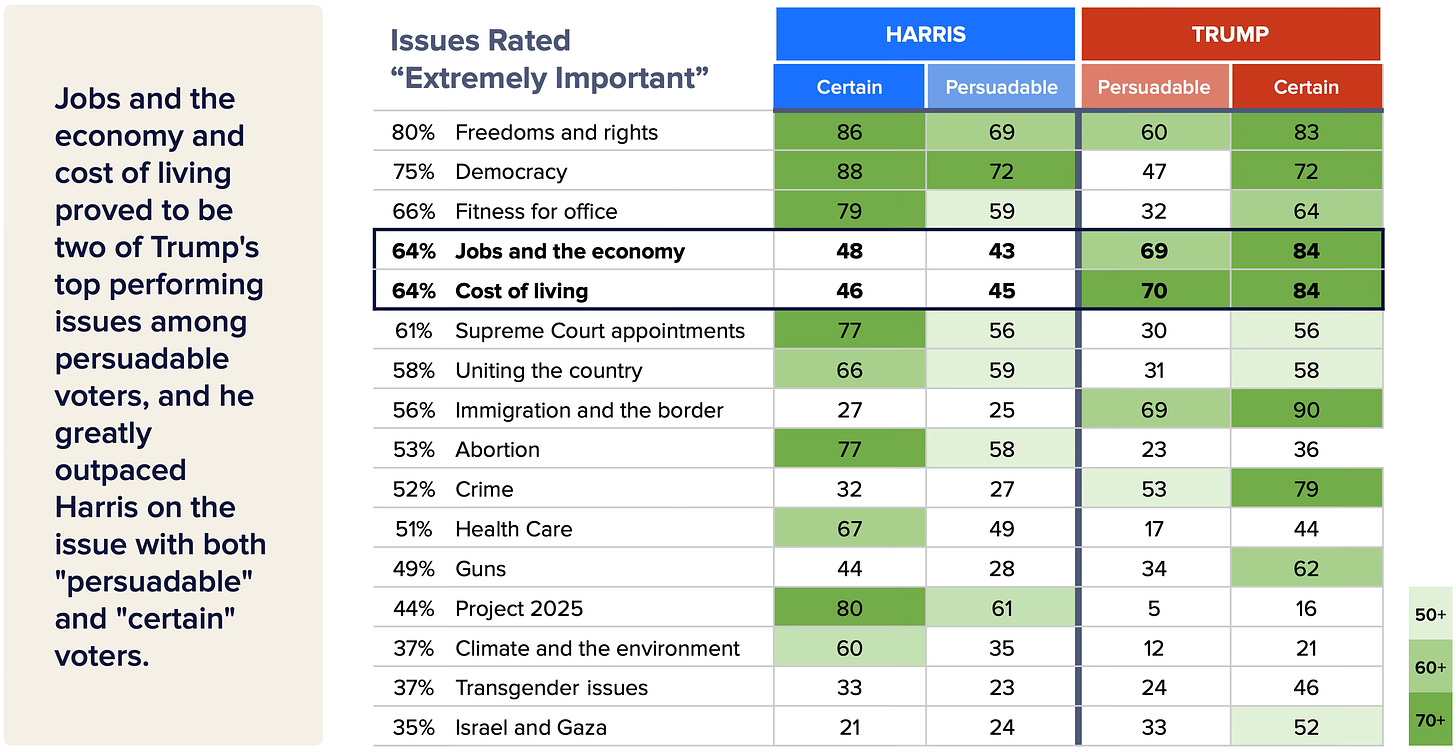
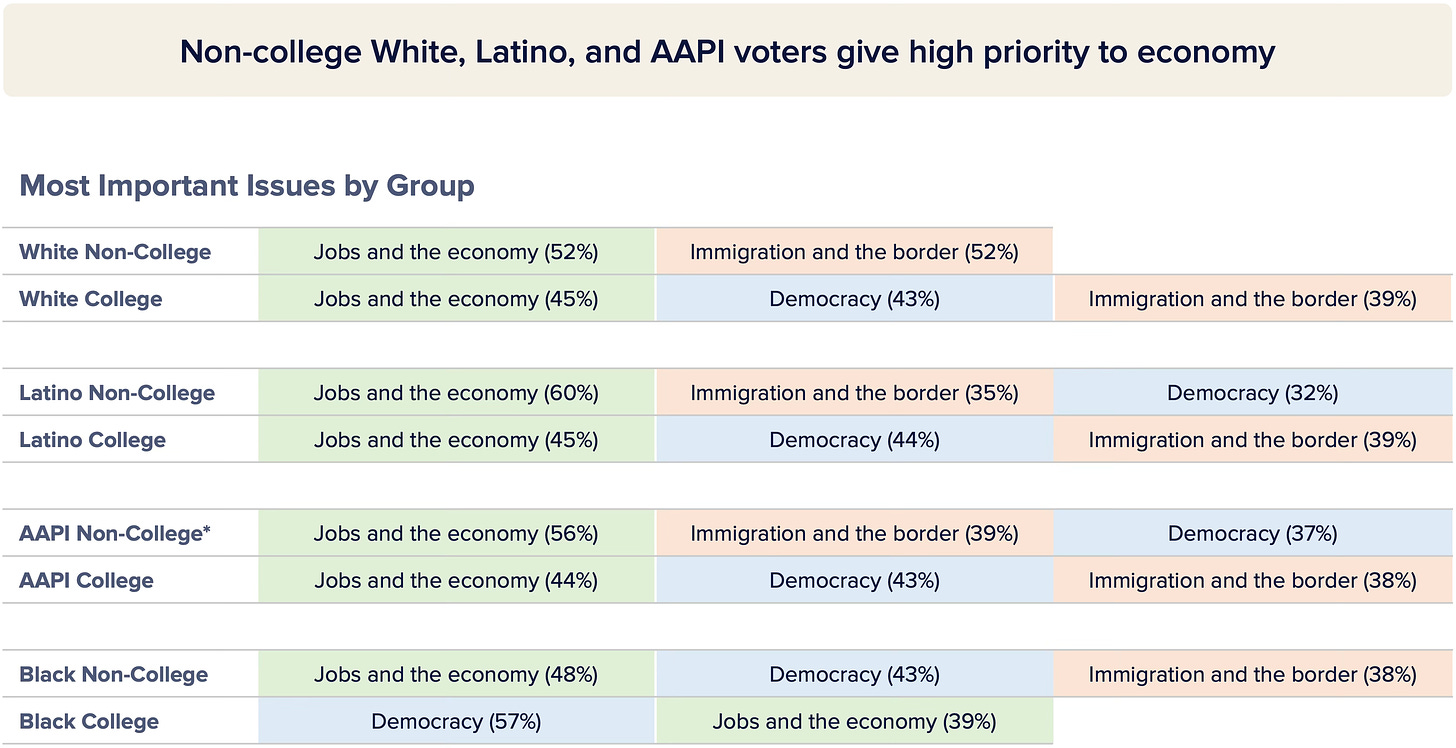
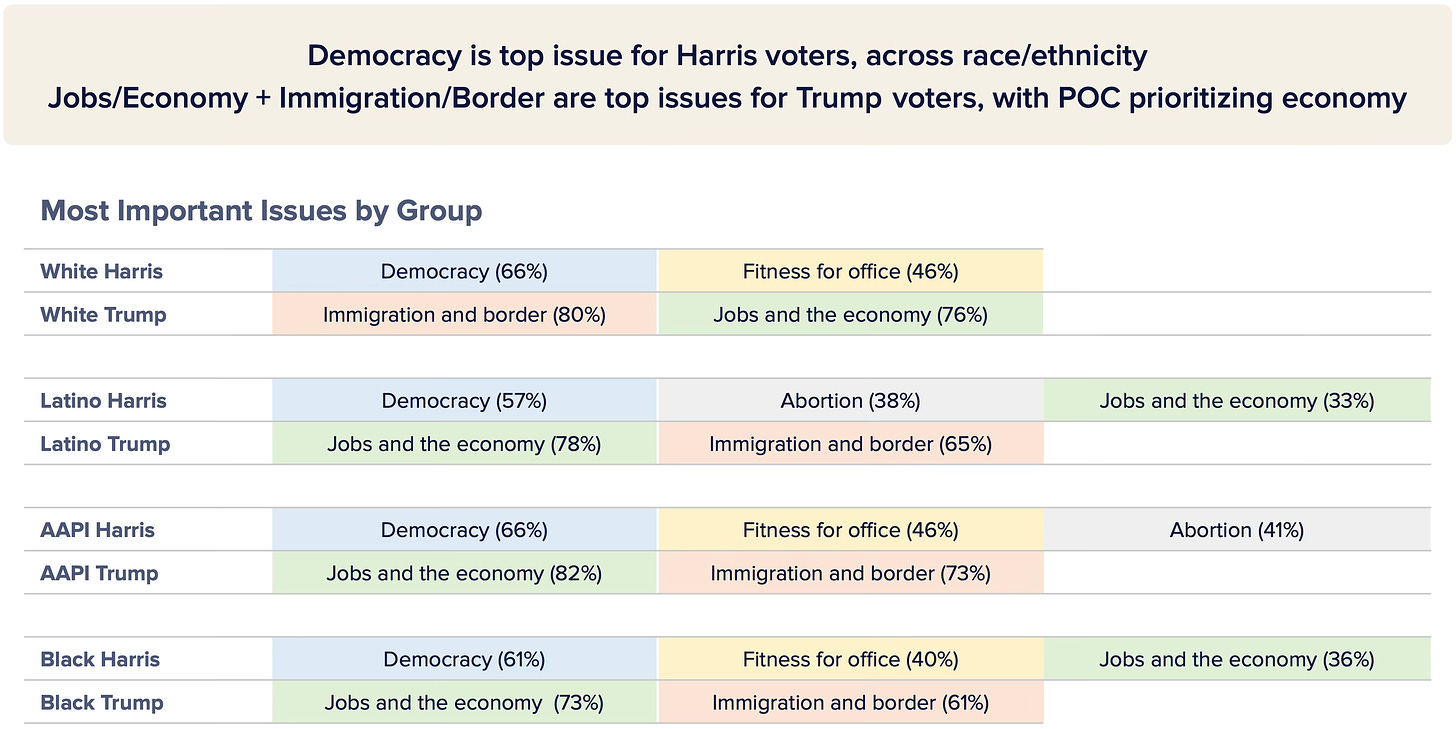
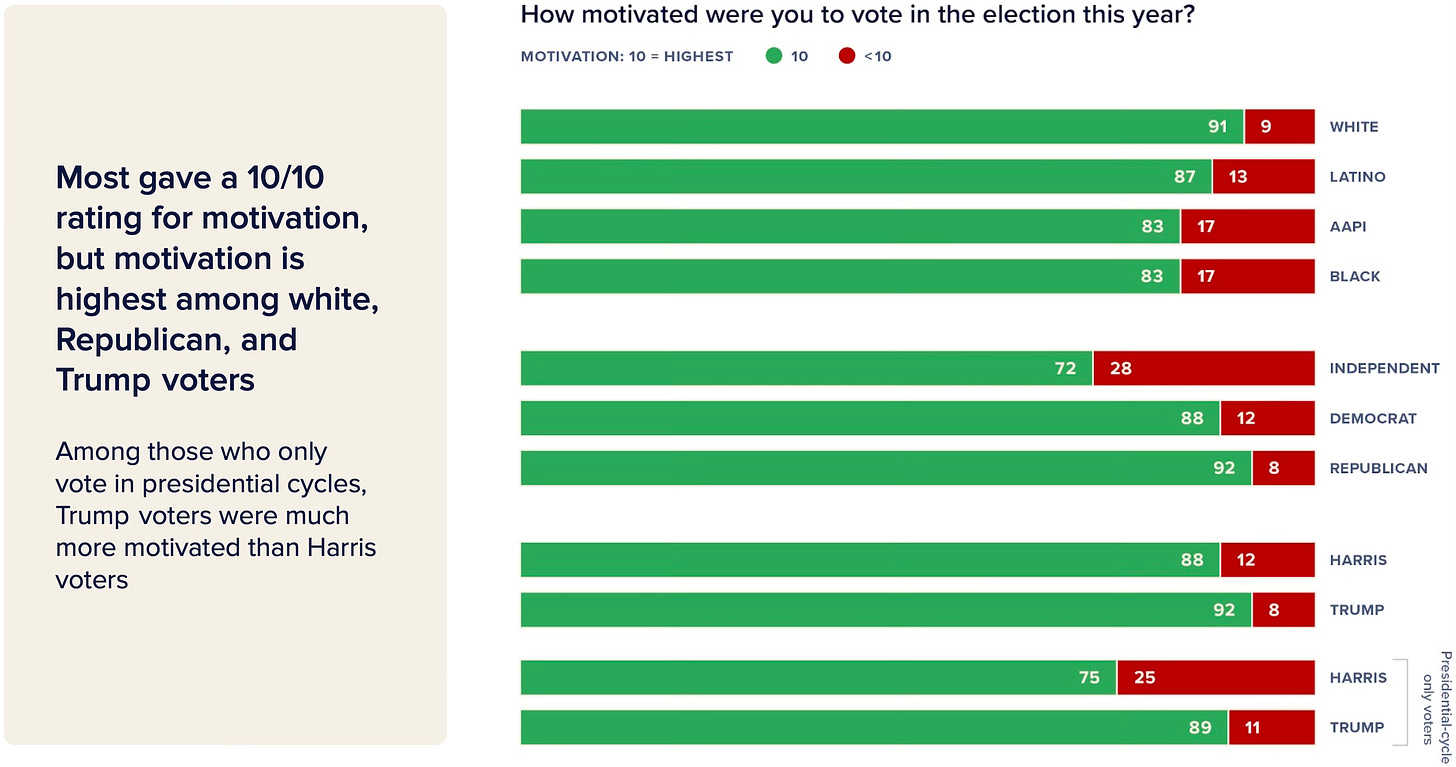
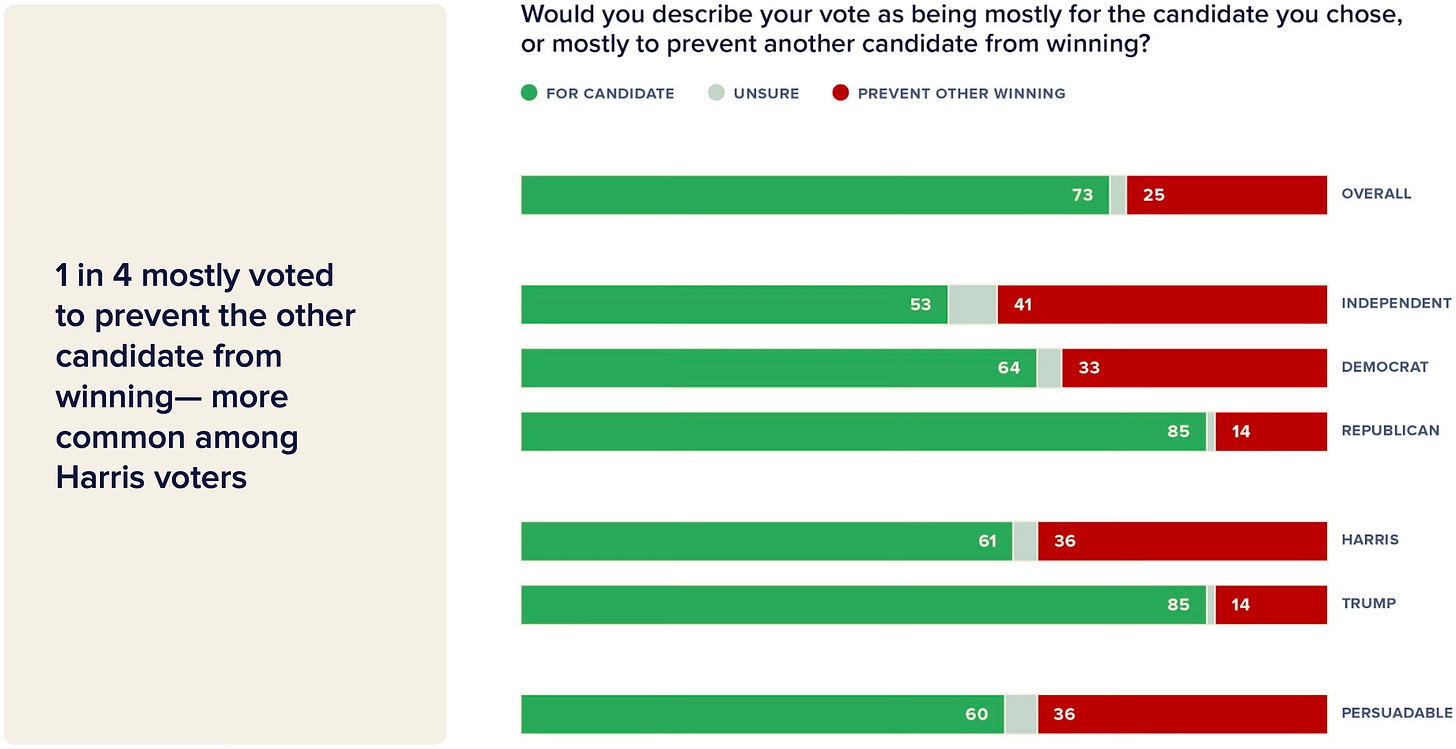
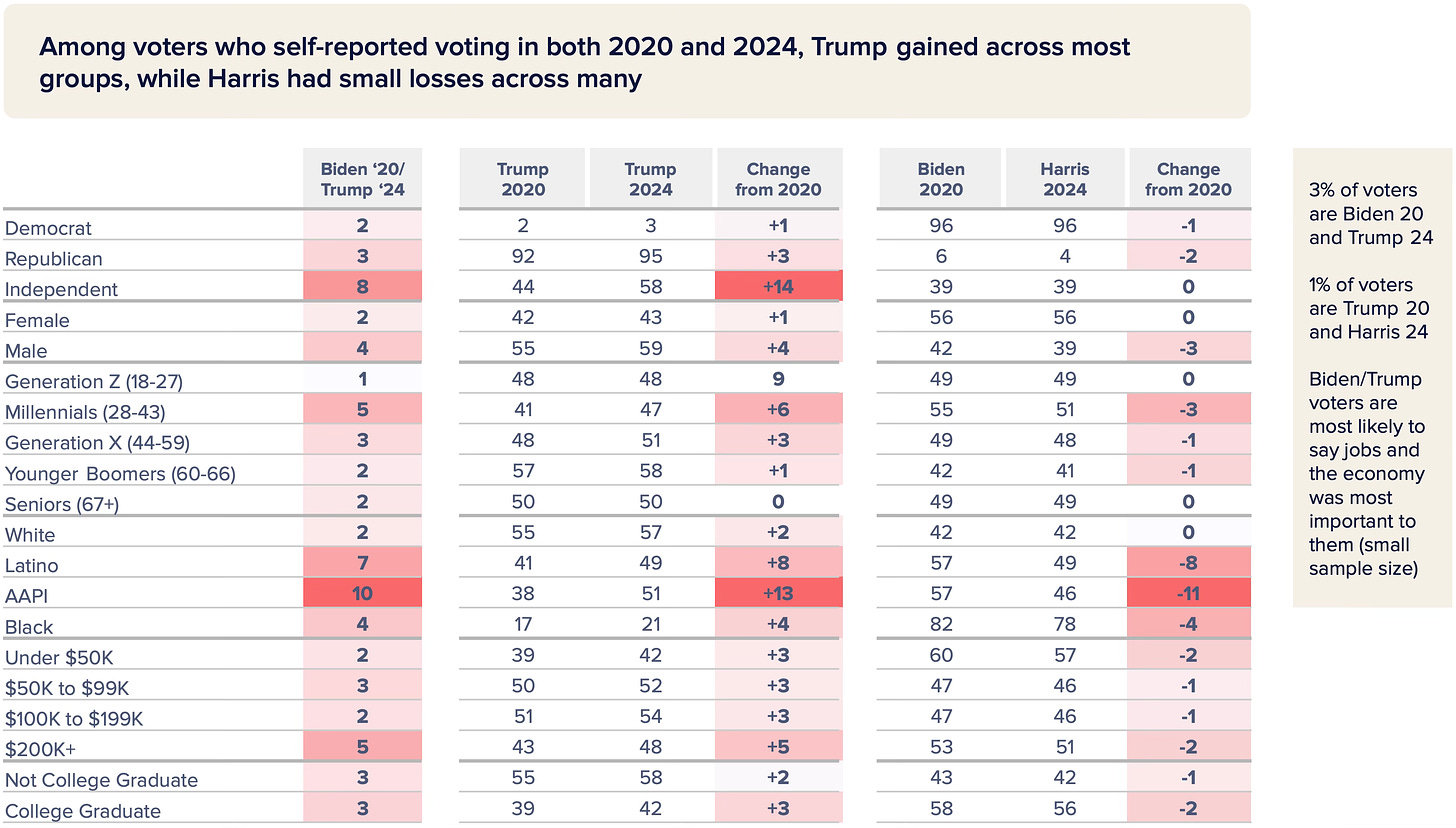
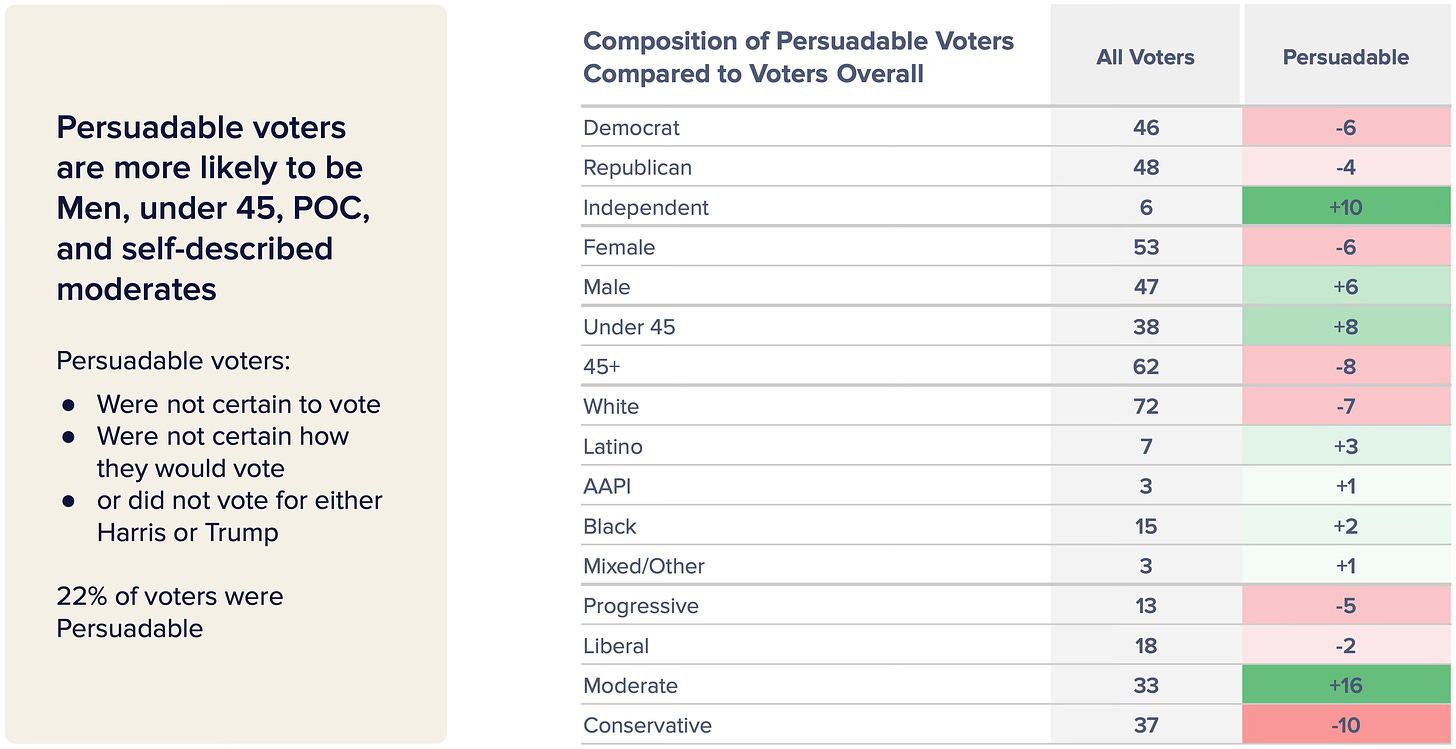
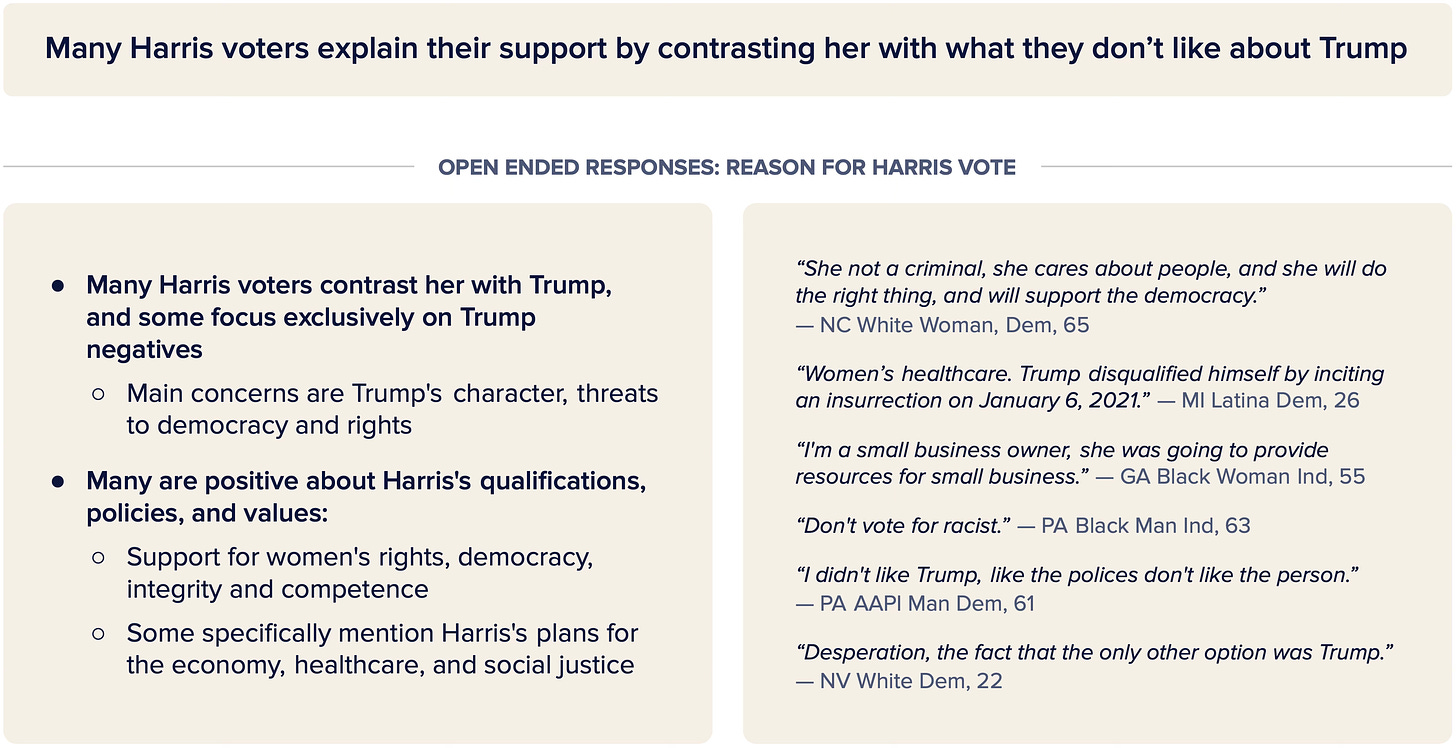
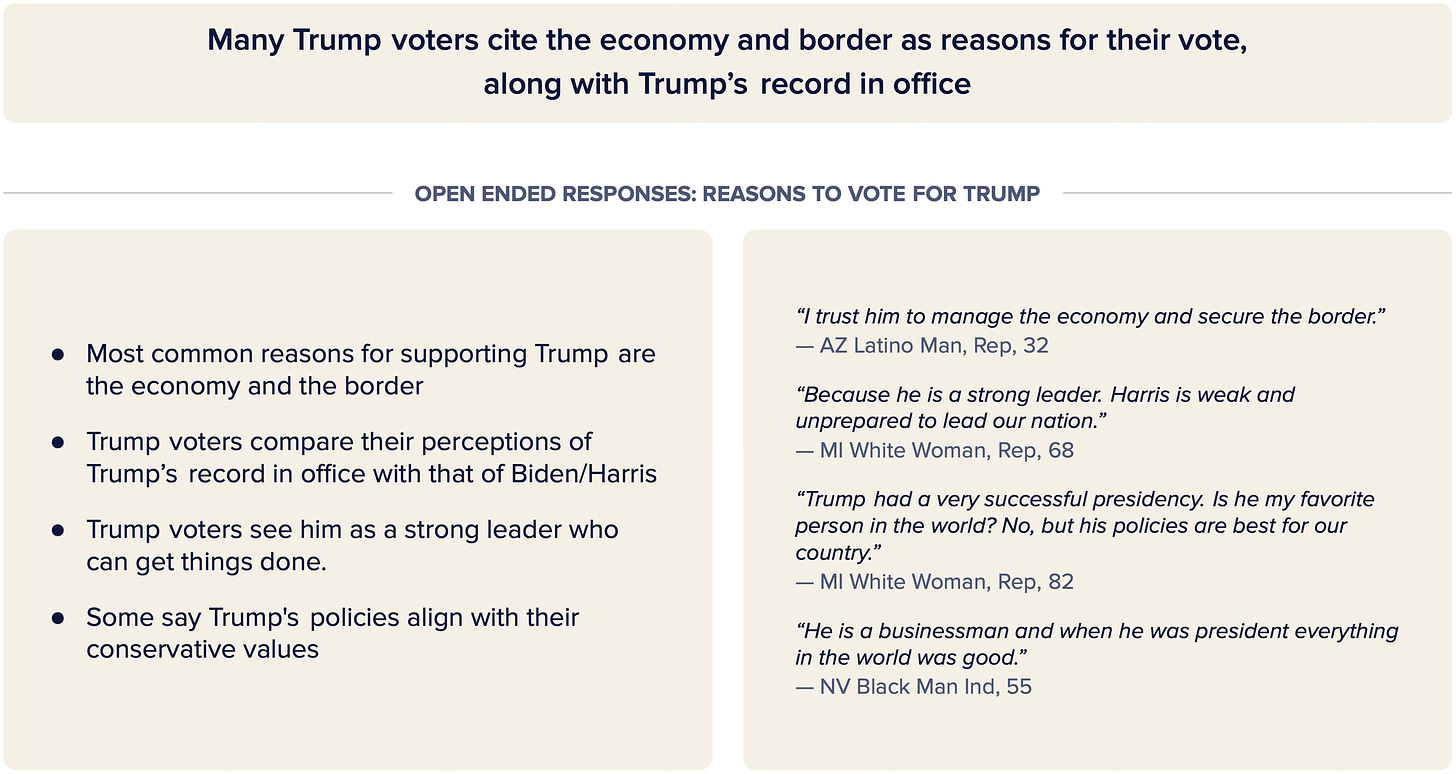
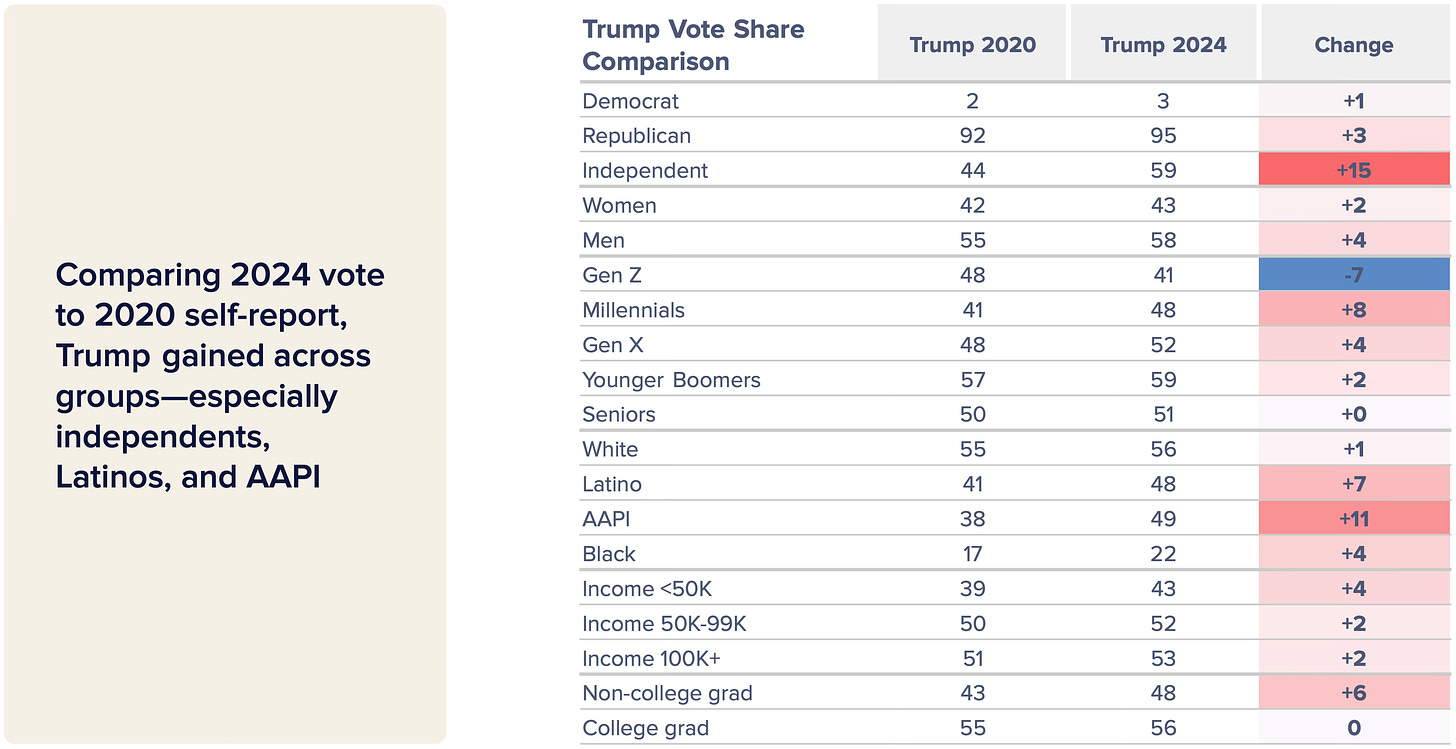
Excellent essay - one of the best I've read post-election. It would be great if you can put out your suggestions for moving forward. I'm deeply involved in working with Dems in rural Maine, and would love best practices for the months ahead.
Very informative memo, thank you. Your conclusion about needing a much sharper attack on predatory capitalism makes total sense. I don't see, from the data shared here, what the recommentation about combating status threat is based on. Also, what excactly does it mean to go on offense against MAGA politics? Would love elaboration on those two questions.